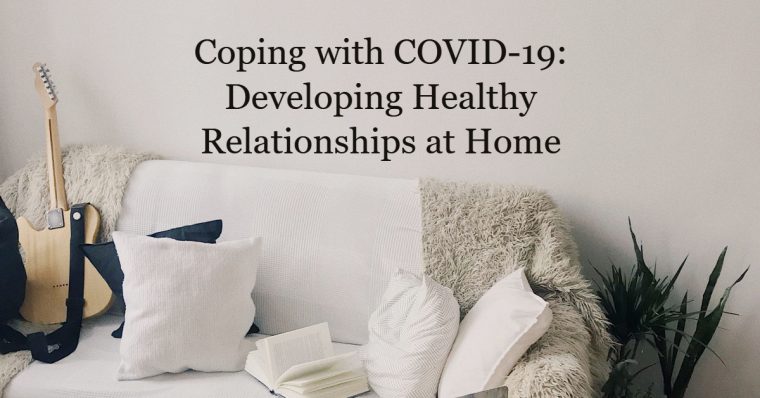For many of us, being asked to stay at home is stretching our abilities to cope with life. Every human has a limited bandwidth to deal with life’s challenges. Being cooped up at home for a month, to help flatten the curve, raises the floor of our personal bandwidth. Our ability to cope with the challenges of COVID-19 shrinks. New additional challenges emerge: new schedules or lack thereof, loss of income, being around the same people 24/7 or being totally isolated, fear of illness or the potential loss of a loved one, wondering when and if we will get back to normal, just to name a few. How can we deal with these new challenges when we have even less emotional and intellectual energy? Fuses are shorter. Frustrations grow. How do we cope?

As I have been talking with people during this crisis I have found that these mounting pressures tend to trigger our personal struggles. We tend to fall back into unhealthy coping patterns like disengaging from others or over engaging by relentlessly crossing personal boundaries. Frustrations are building.
What can we do to have healthier responses and build a better functioning home life?
First you need to understand, you don’t have to be perfect to be a good father, mother, roommate or child. Some of the ideas I am going to share with you, you won’t be perfect at. You will need to repair when you blow it. (We will talk more about that in a bit.)
Safety – Emotional and Physical
Being stuck at home is hard on everyone. The way we engage others will determine how safe the environment is. If there is a lot of yelling, screaming, physical altercations, or even lack of engagement people don’t feel safe. We need to pay attention to our tone. Our tone goes a long way in creating a place where people feel safe.
(If you are struggling with your tone you will need to take time for self-reflection to help you understand what is going on inside of you so you can make sense of your own narrative. I will say more about this next week.)
Helping people feel seen and heard will help people feel safe.
Seen & Heard
When we are all cooped up in the same home and no one really notices you or interacts with you, it leaves you feeling like you don’t matter. No one cares. Yes, it is possible for you to live with a group of people and feel isolated, alone or abandoned. We need to engage others. We need to notice what others are doing and ask them how they are feeling. This is true for everyone, but especially true for you parents out there.
Side note to parents: Developmentally our kids don’t have the same capacities to comprehend what COVID-19 is and why we have to stay at home. Many of our kids feel bored and don’t know how to cope with all this extra time. That is why many of them will act out — and it is driving us crazy! Trying to develop a basic schedule for this COVID season will help bring some normalcy to your life. It is critical that you pay attention to their emotions and help them process them.
A healthy way to engage others (adults or children) is what I call the avenue of communication: “A.V.E.”
Acknowledge:
When we are talking to others we need to seek to understand them by acknowledging what they are saying. You can do that by using the skill of reflective listening – putting in your own words what you heard the other person say.
Validate:
Then it is important to validate their emotions. It might go like: “When I said _____, it made you feel _____.” Or: “You’re feeling really bored because ______.” People often don’t feel heard until you understand how they feel.
Explore:
This is a point in the conversation for you to ask questions to clarify what they are feeling or help them think through the issue. Your tone will be critical. We aren’t trying to interrogate, rather, we are trying to understand. You could ask questions like: “What did you mean by_____?” “Interesting, how did you come to that conclusion?” “Have you considered…?” Again, the goal is understanding the other person.
Comfort by Connecting
When we are dealing with a crisis we need to expect people won’t always respond well. We need to learn to comfort others by “connecting before you correct/clarify.” When someone is upset or angry we need to remember there is usually pain driving the anger. For many of us, our tendency is to correct first and then maybe try to smooth things over. When we first seek to comfort by connecting (see AVE), people tend to feel heard and we can deescalate tense moments. When people are struggling they need to be seen and heard before they can make a change.
Consistent
Being consistent in our responses by acknowledging, validating, exploring and comforting — instead of reacting — is going to create a healthy environment.
Repair
We are going to blow it. The floor of our bandwidth has been raised. We are going to fail. That doesn’t mean you are a total failure. It means you’re human! When we fail we need to repair. Eph. 4:32 states, “Be kind and compassionate to one another, forgiving each other, just as in Christ God forgave you.”
We need to own our mistakes and ask for forgiveness. We need to acknowledge how we have hurt the other person. We need to accept the consequences and alter our behavior. I will often employ the “AVE” of communication in this conversation.
When we work at repairing, it communicates that we care. It helps us create a safe and healthy environment.
Take some time today to reflect on your interactions at home. Which of these areas do you need to work on? How can you become more effective at acknowledging, validating, and exploring with others? As you grow in these skills your relationships will flourish even in the midst of this COVID season.

Please note: I reserve the right to delete comments that are offensive or off-topic.